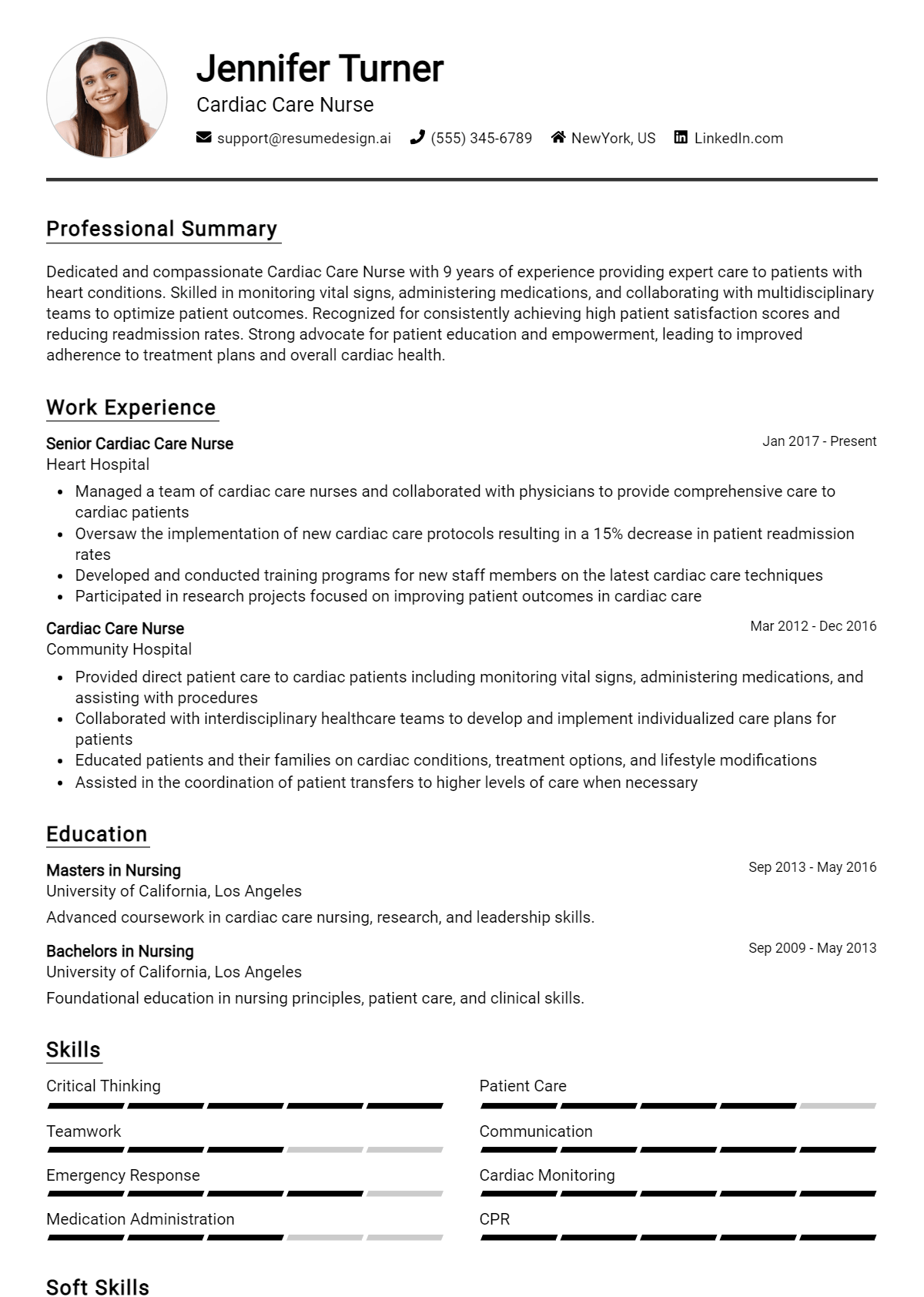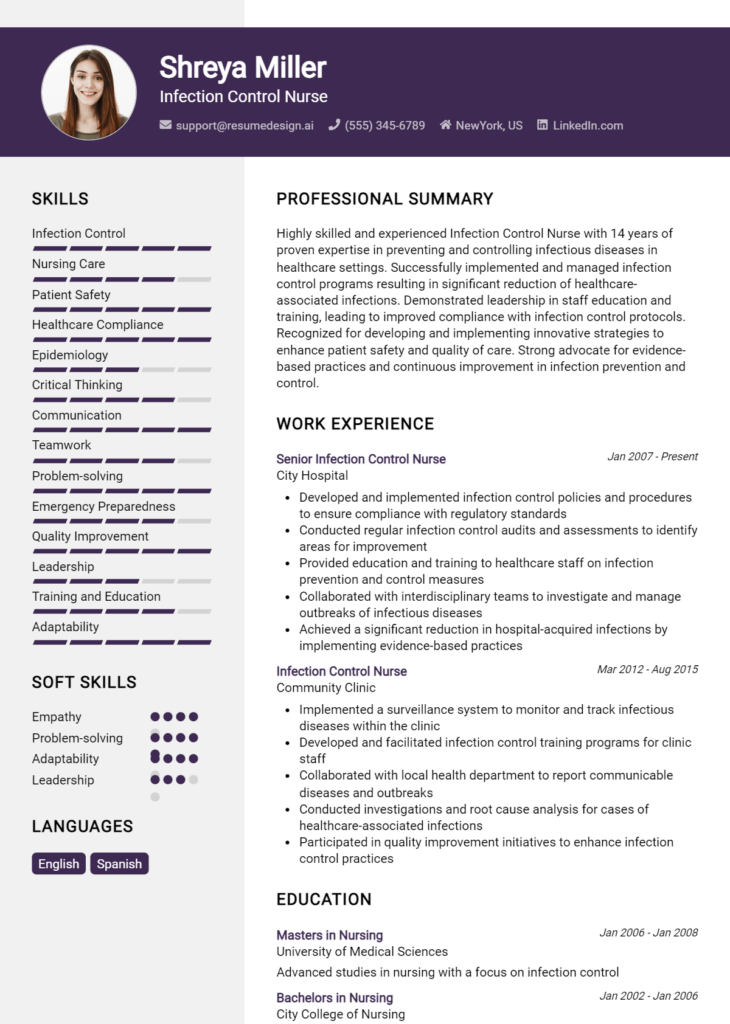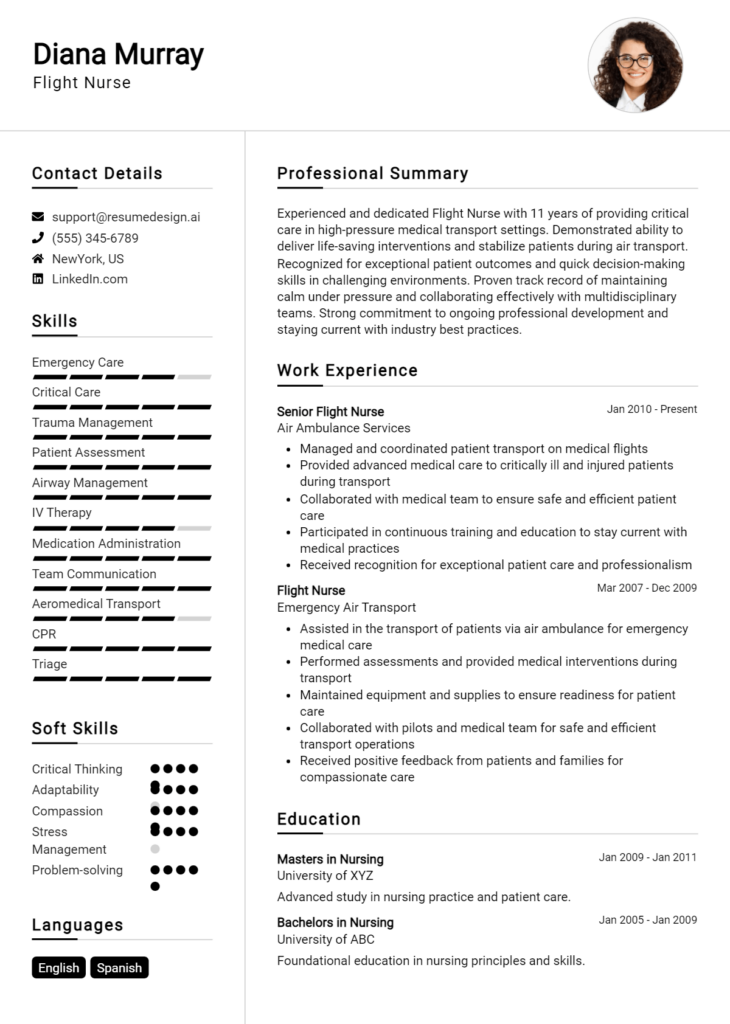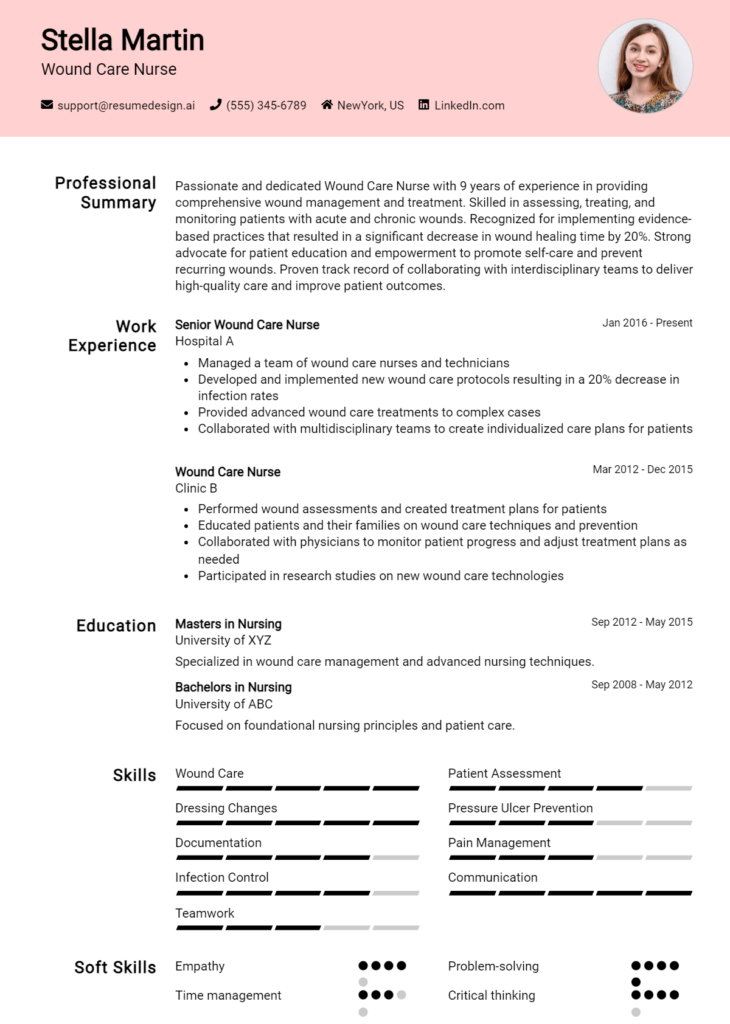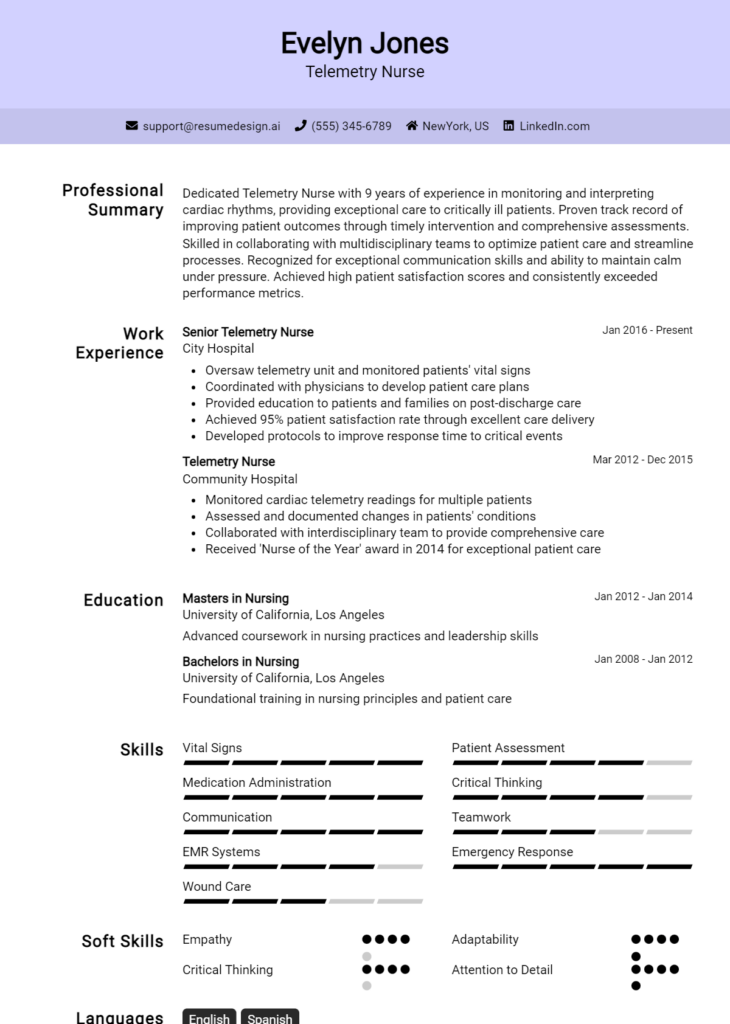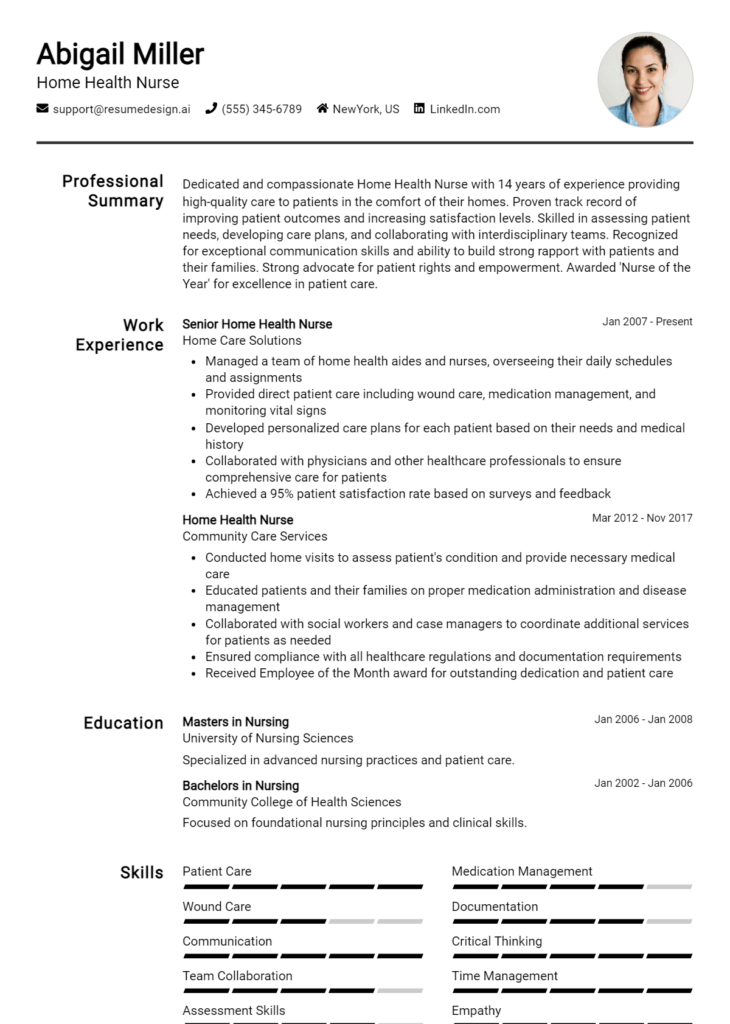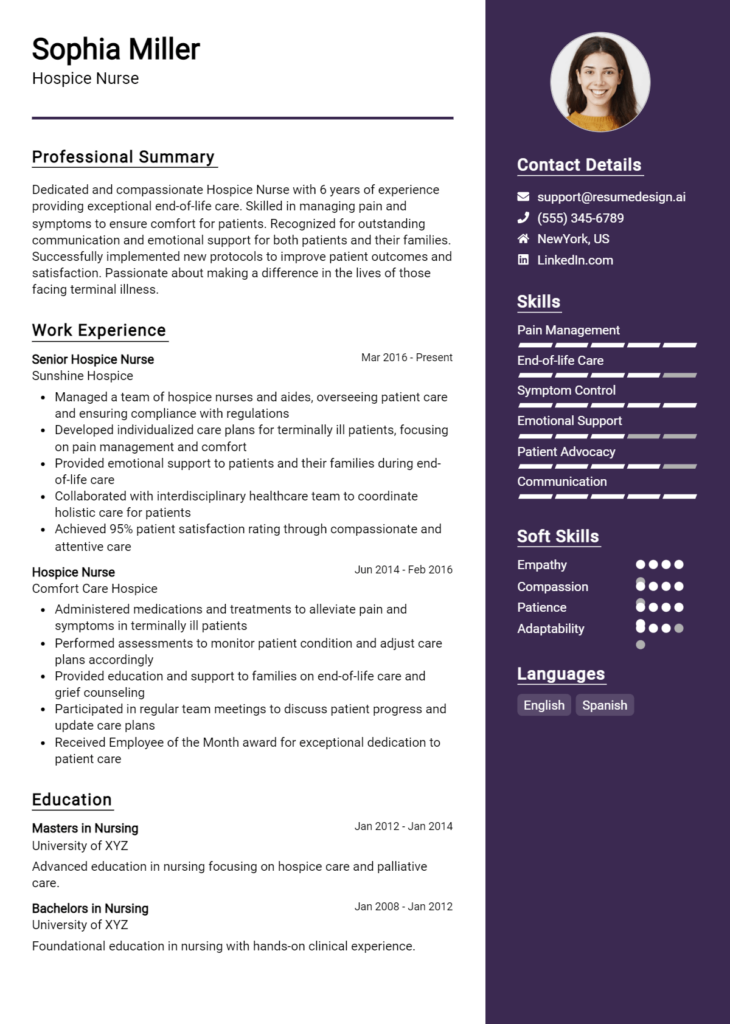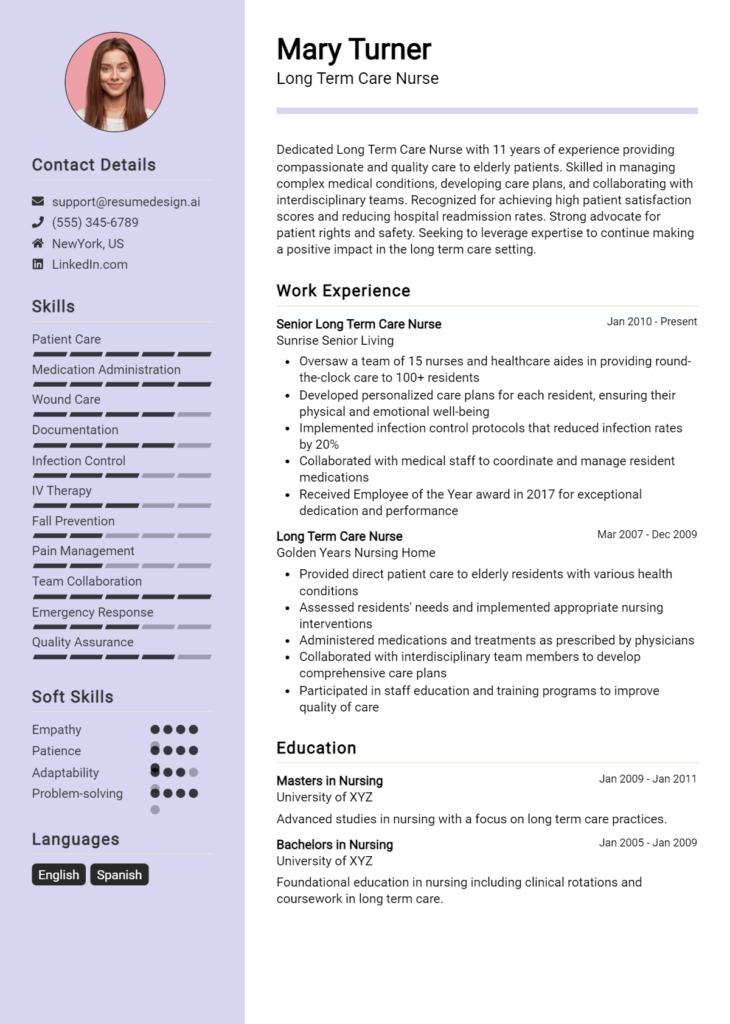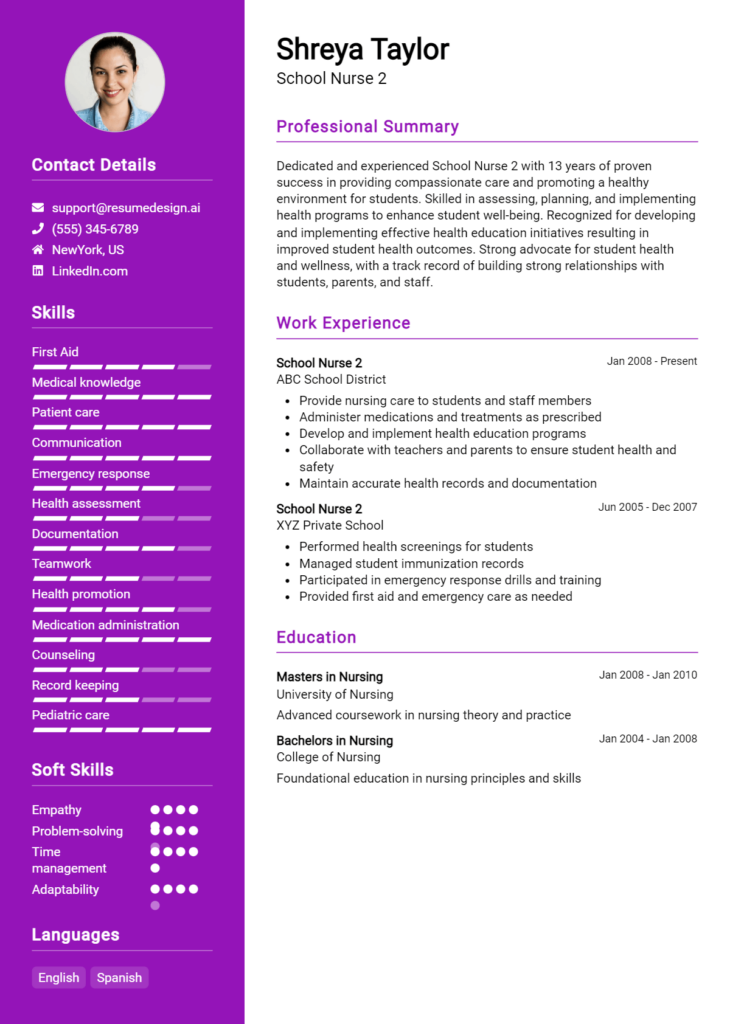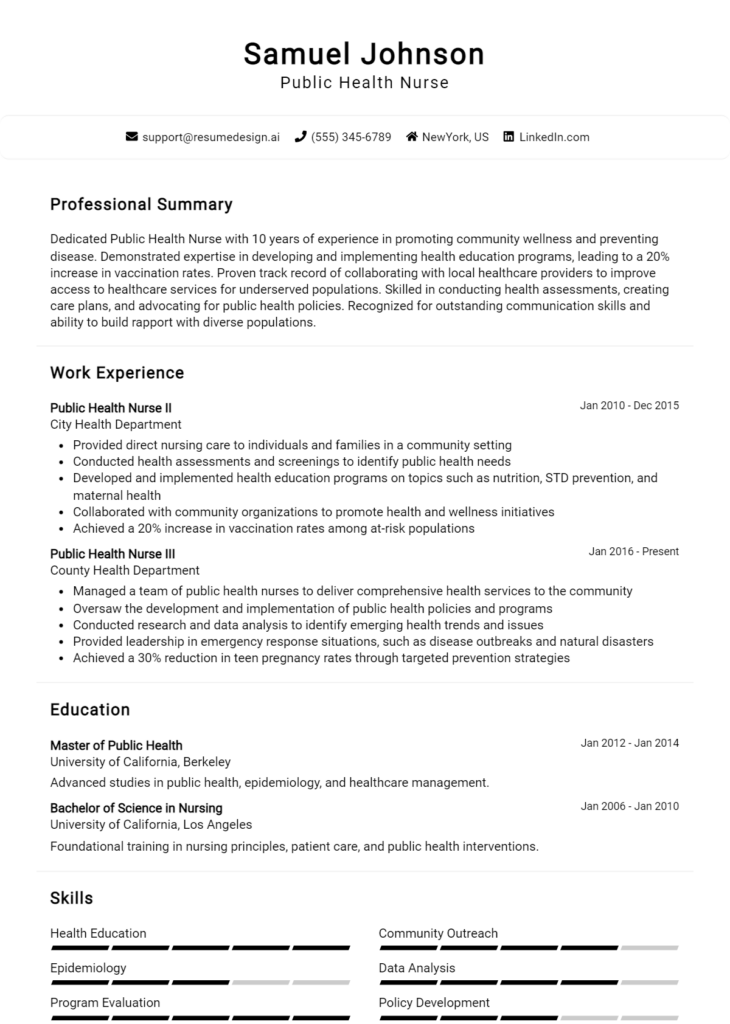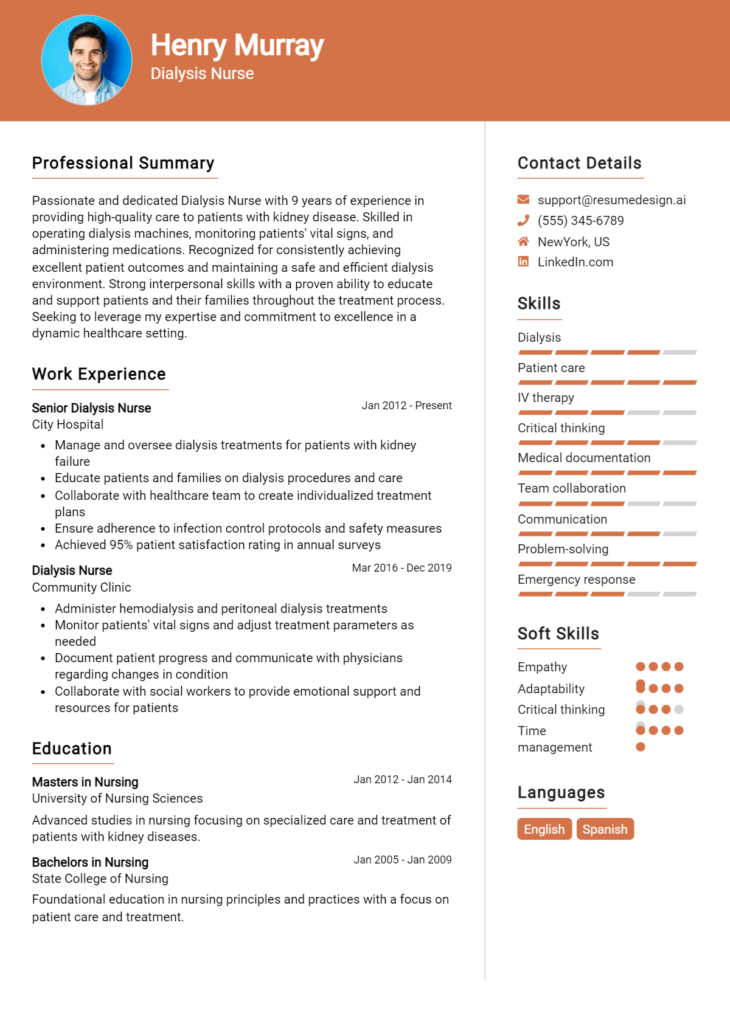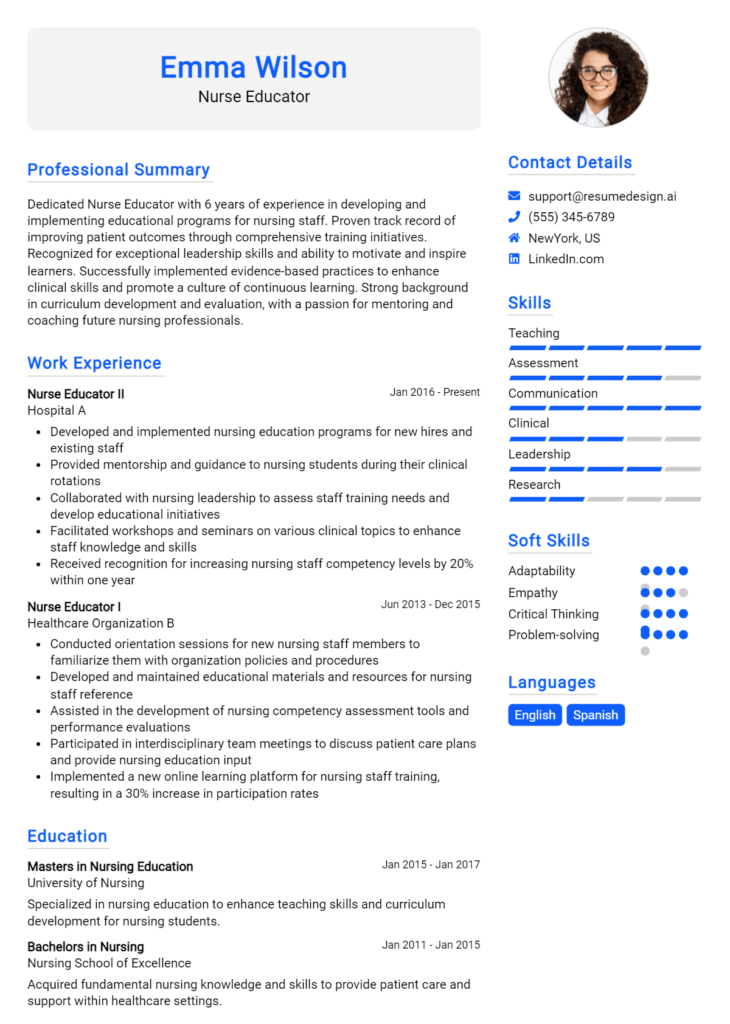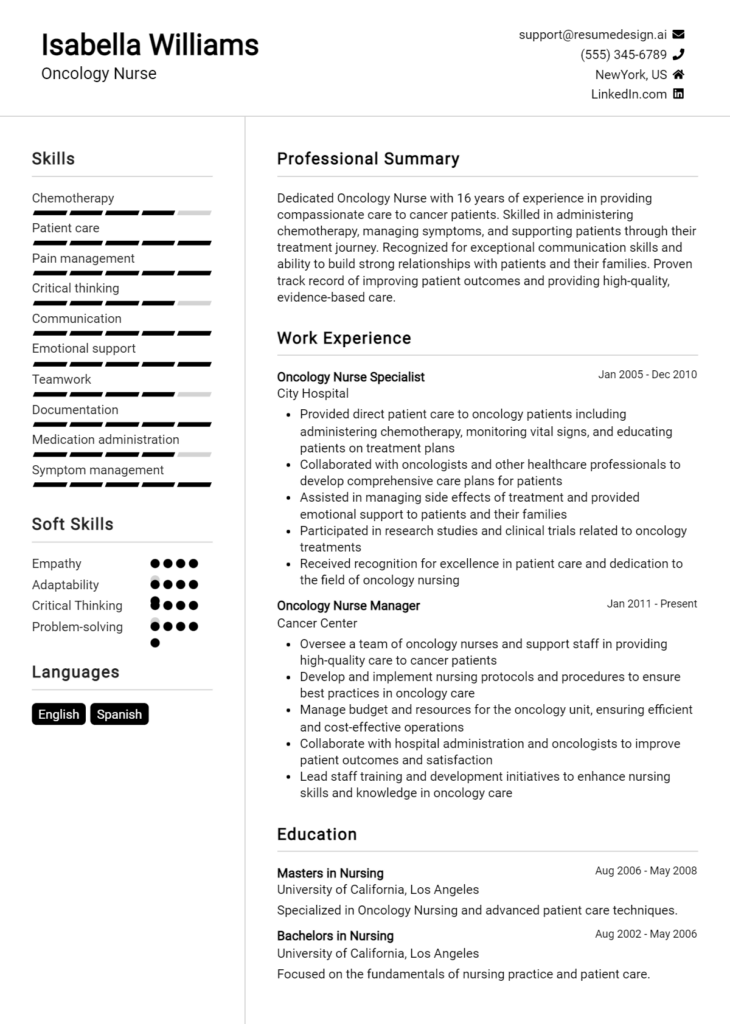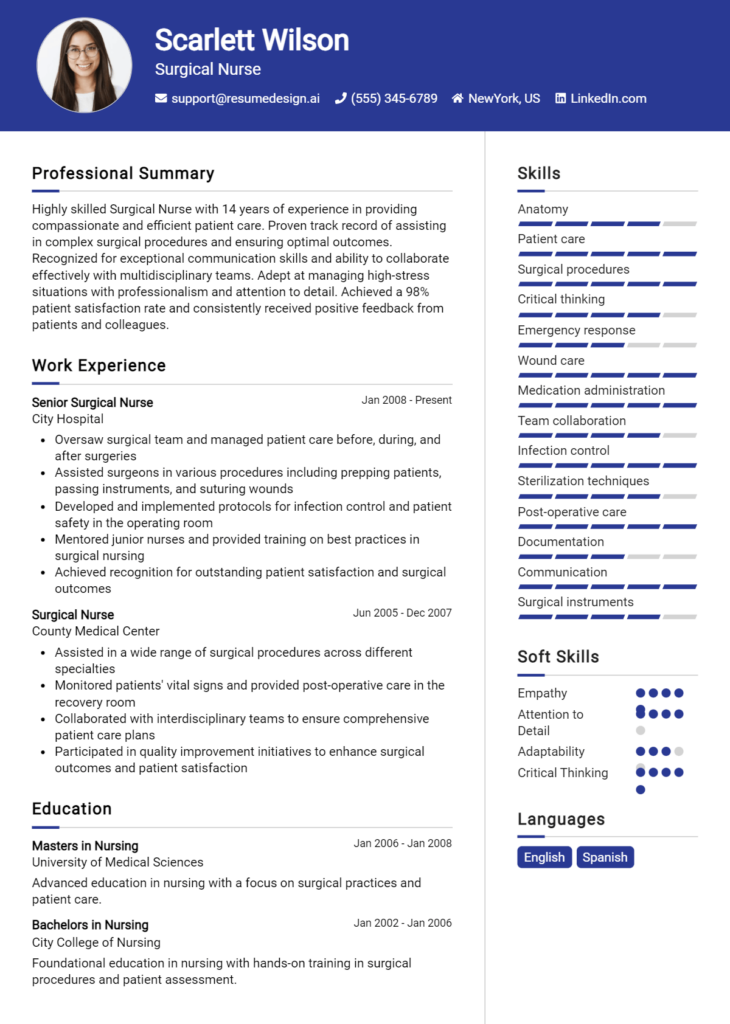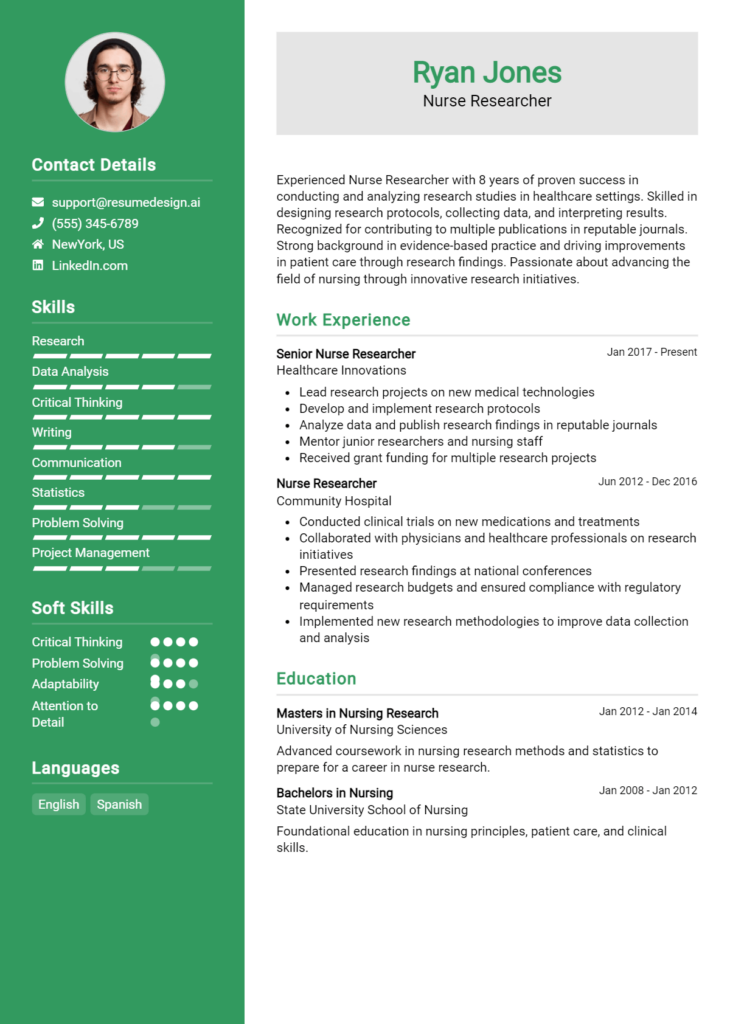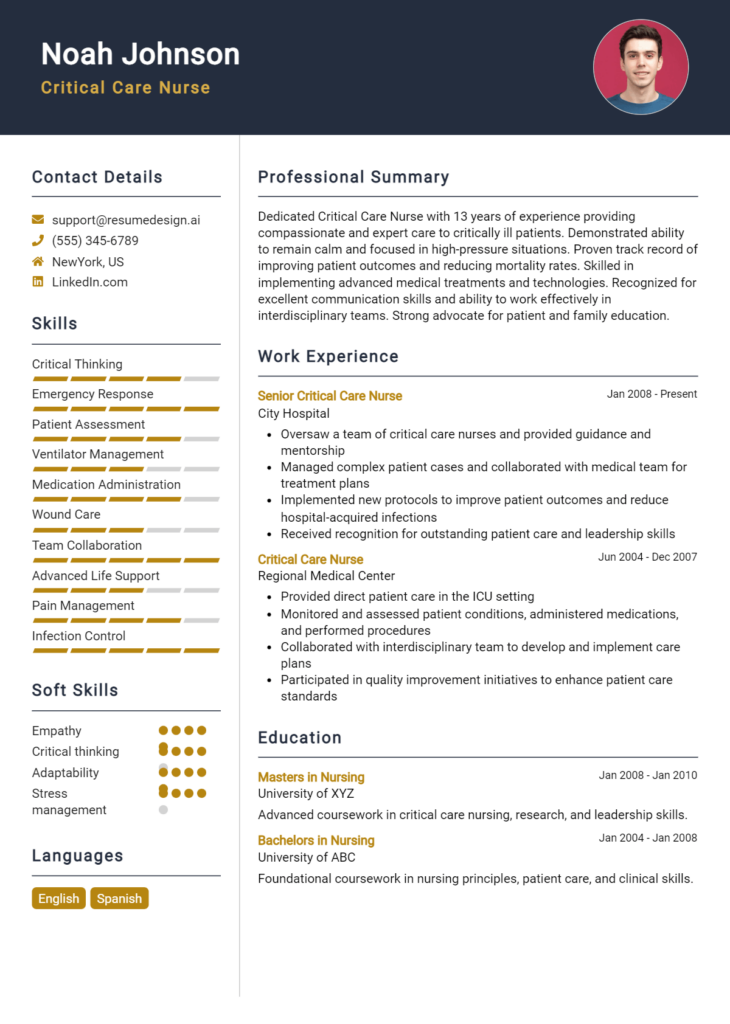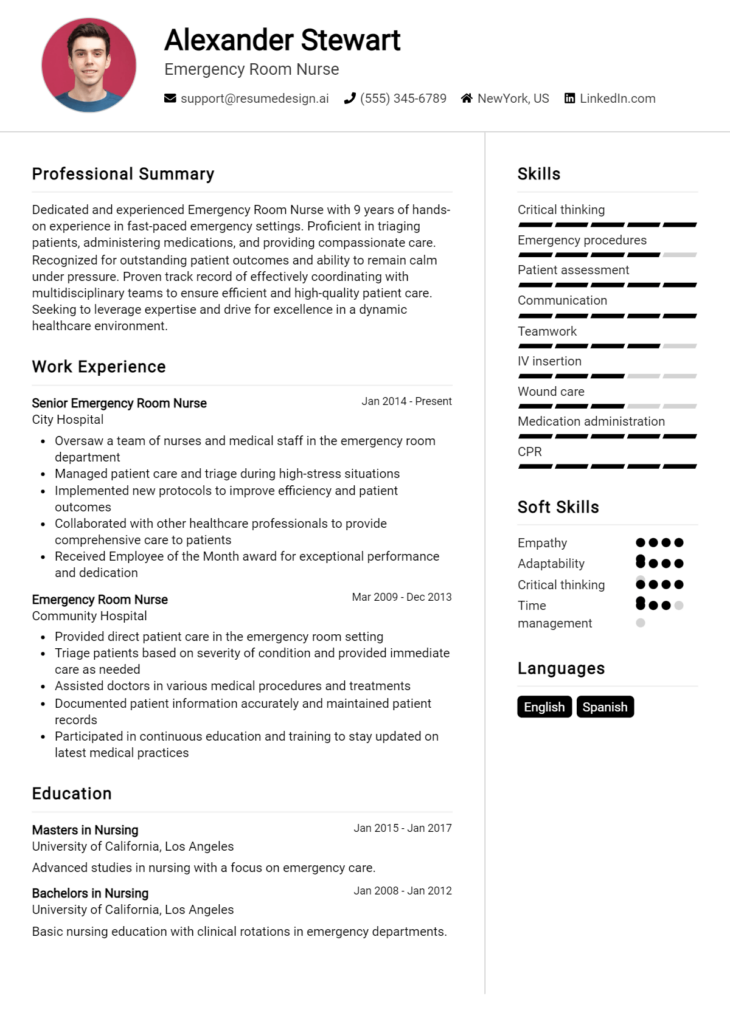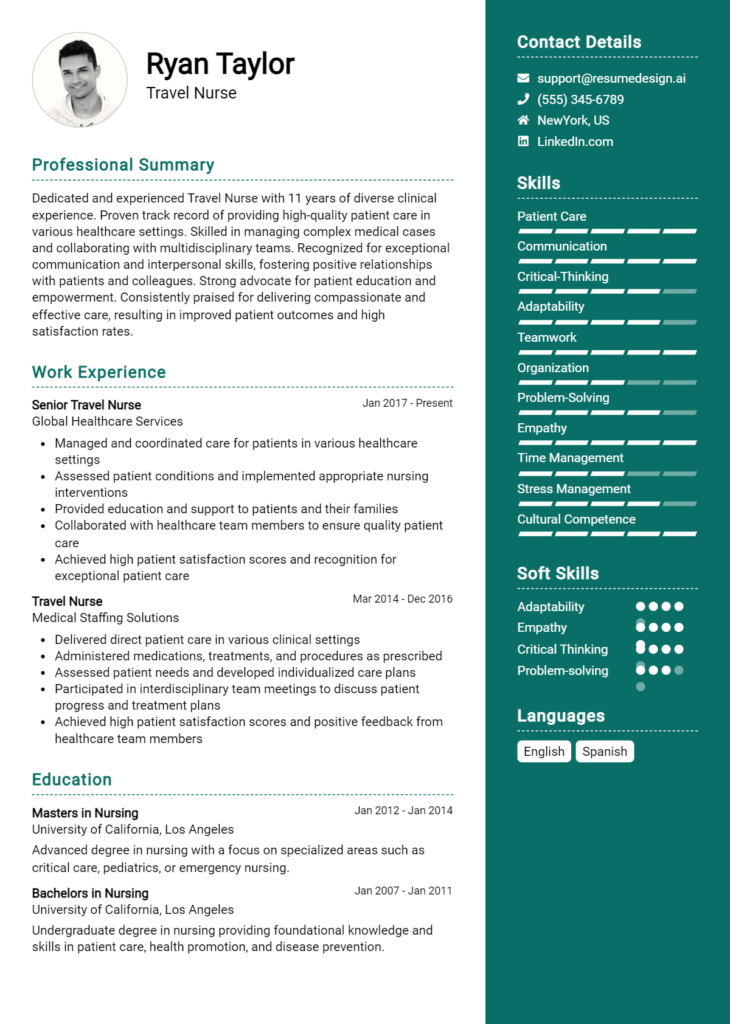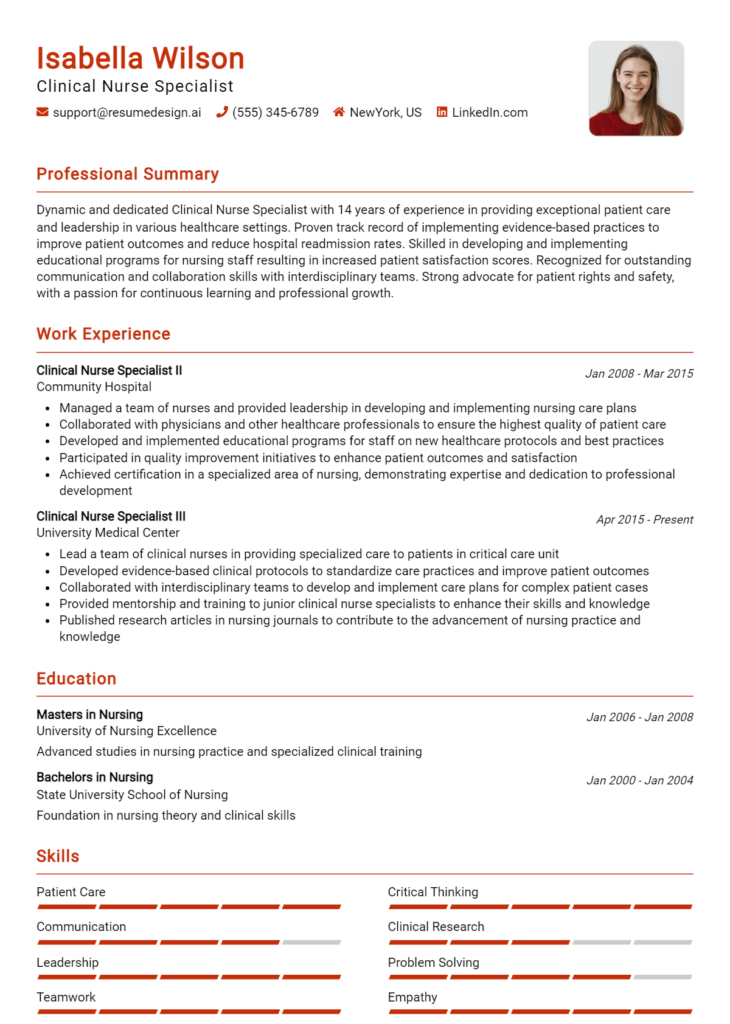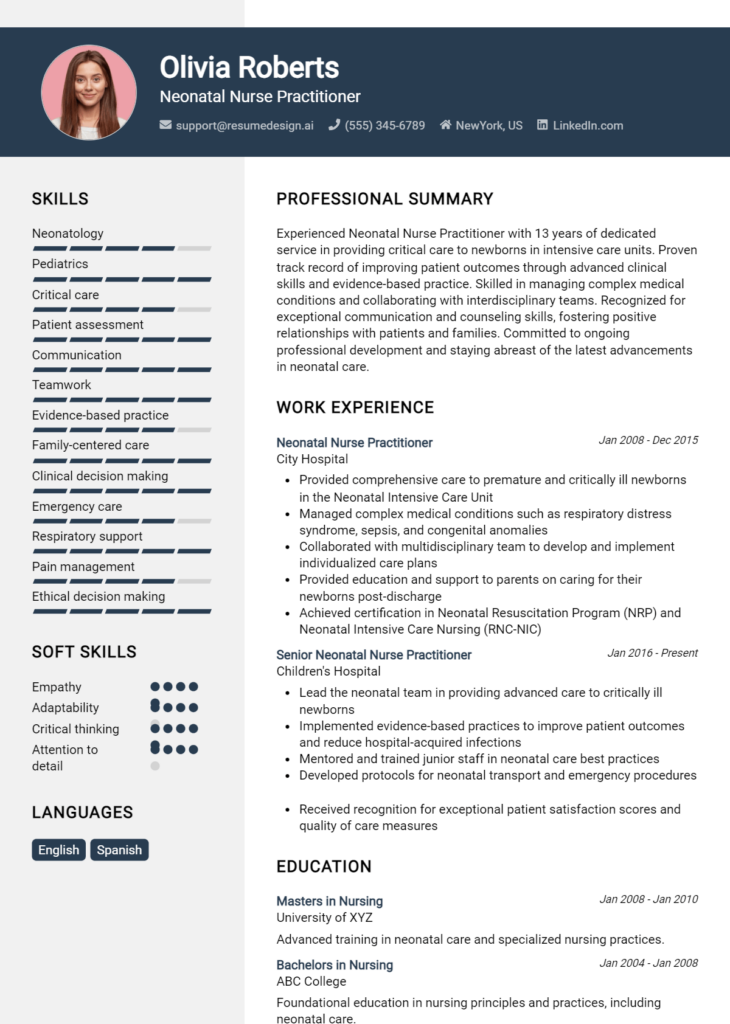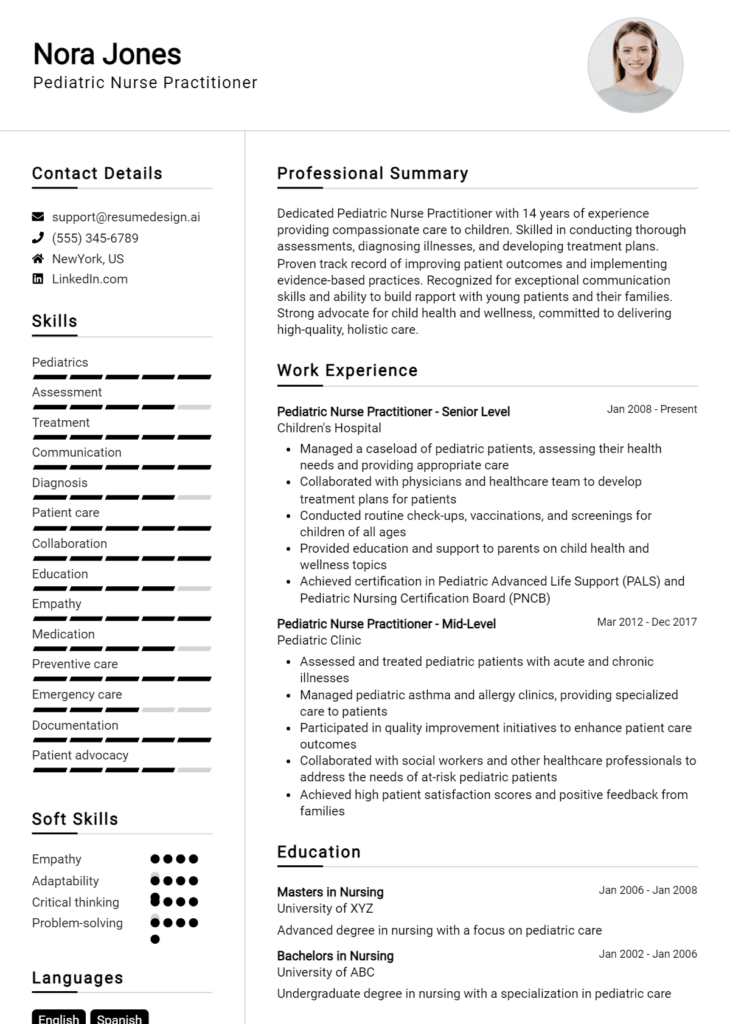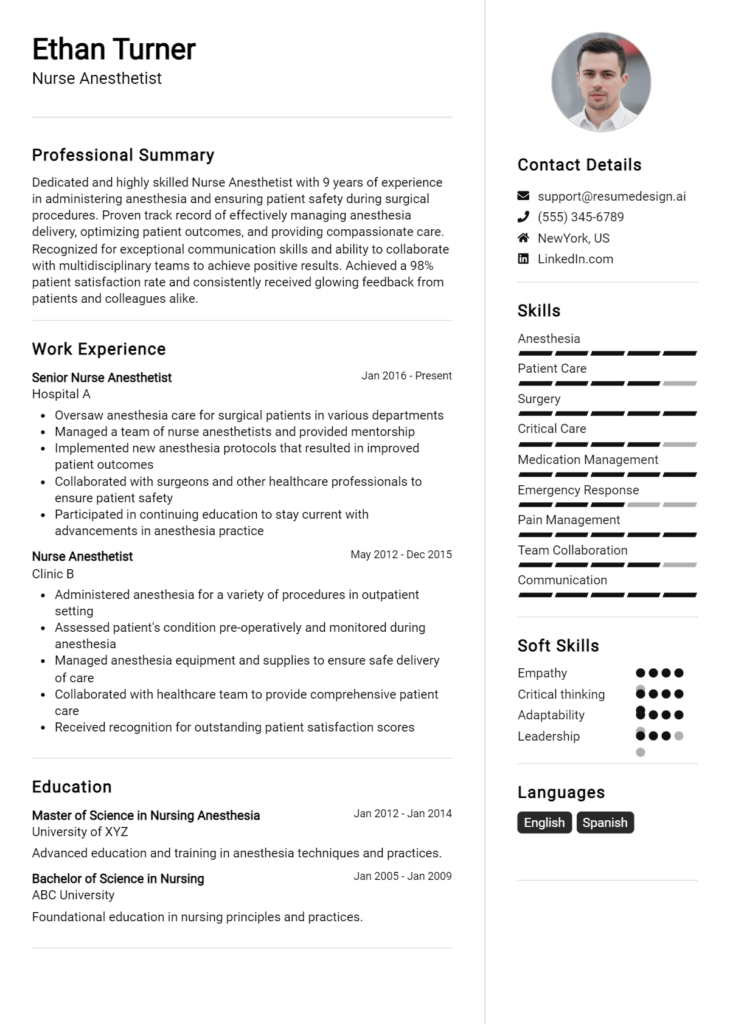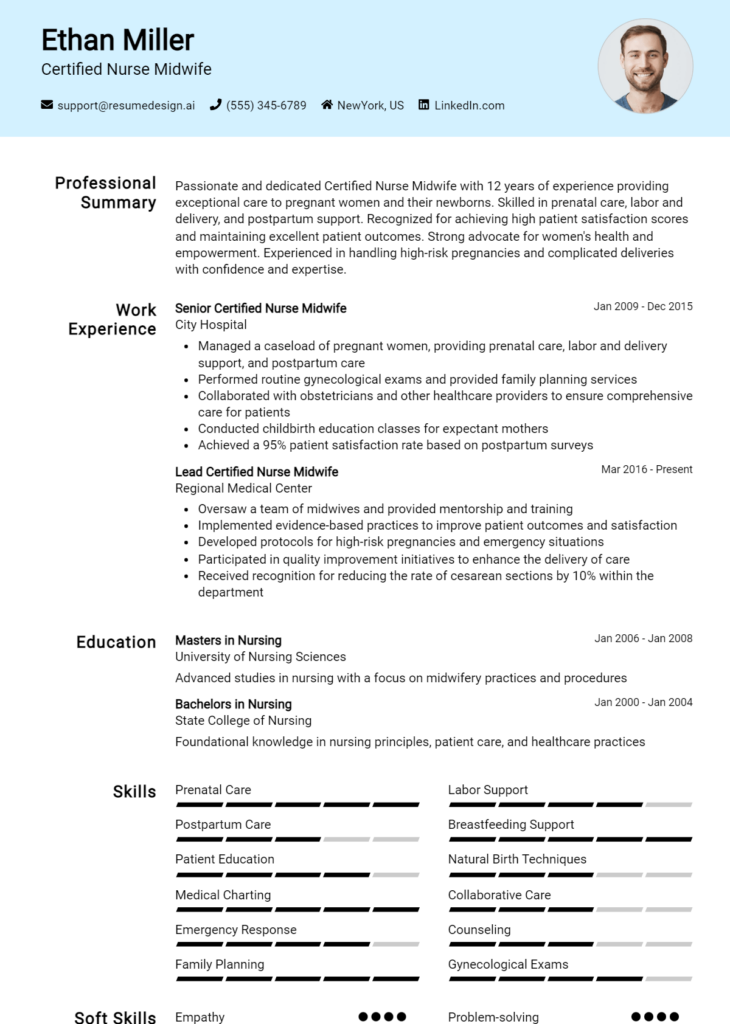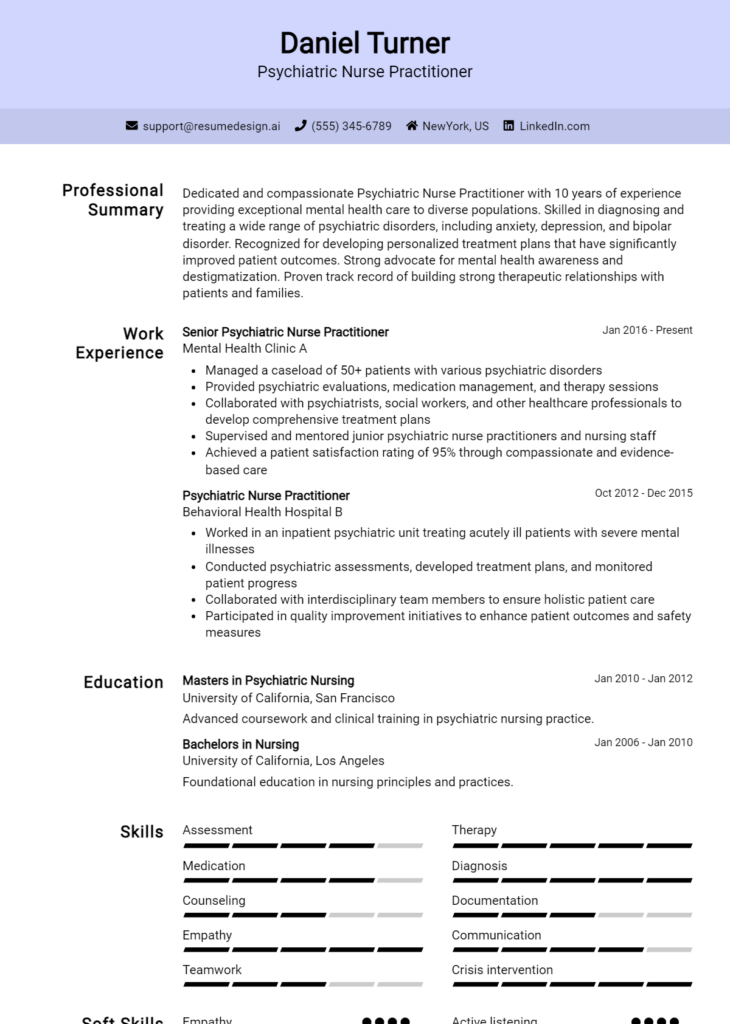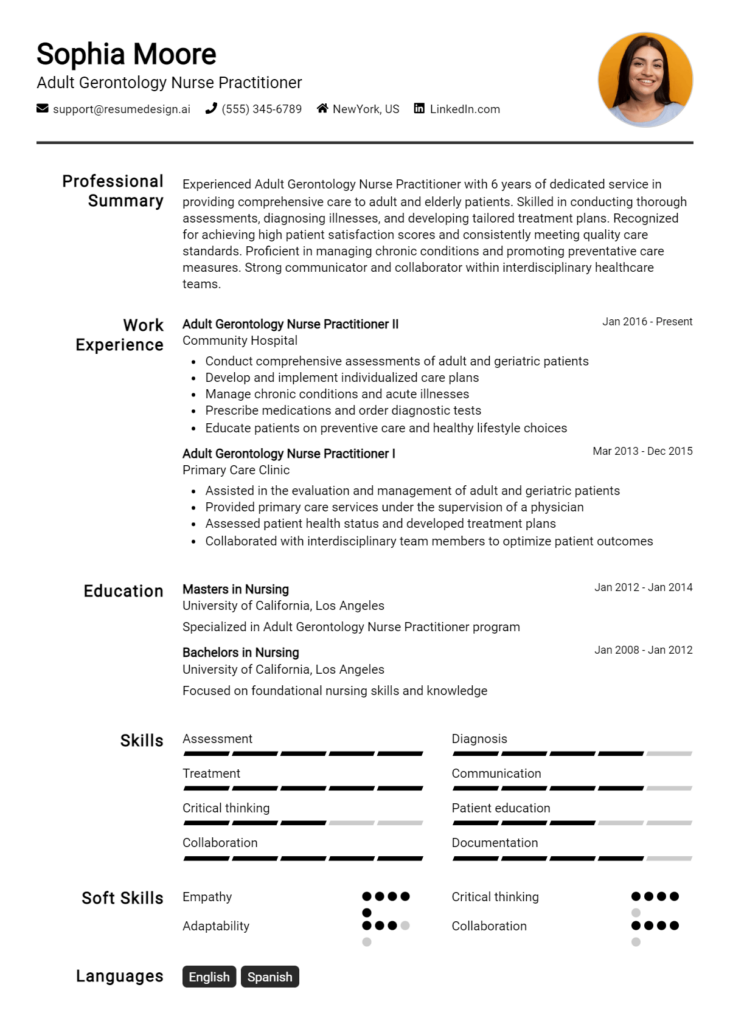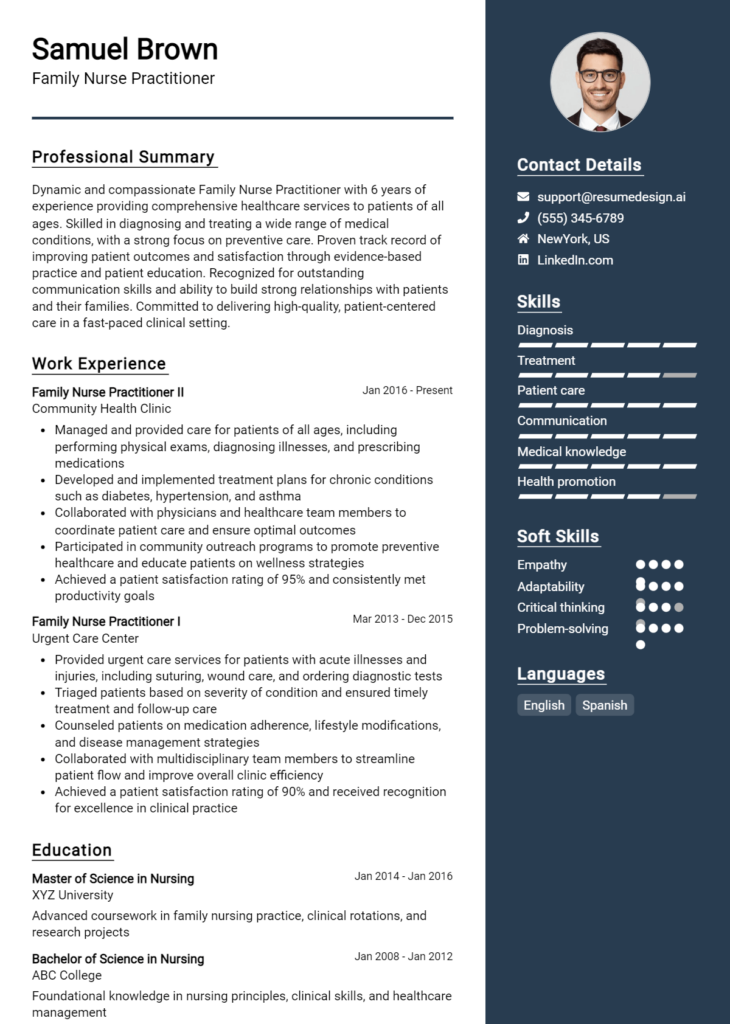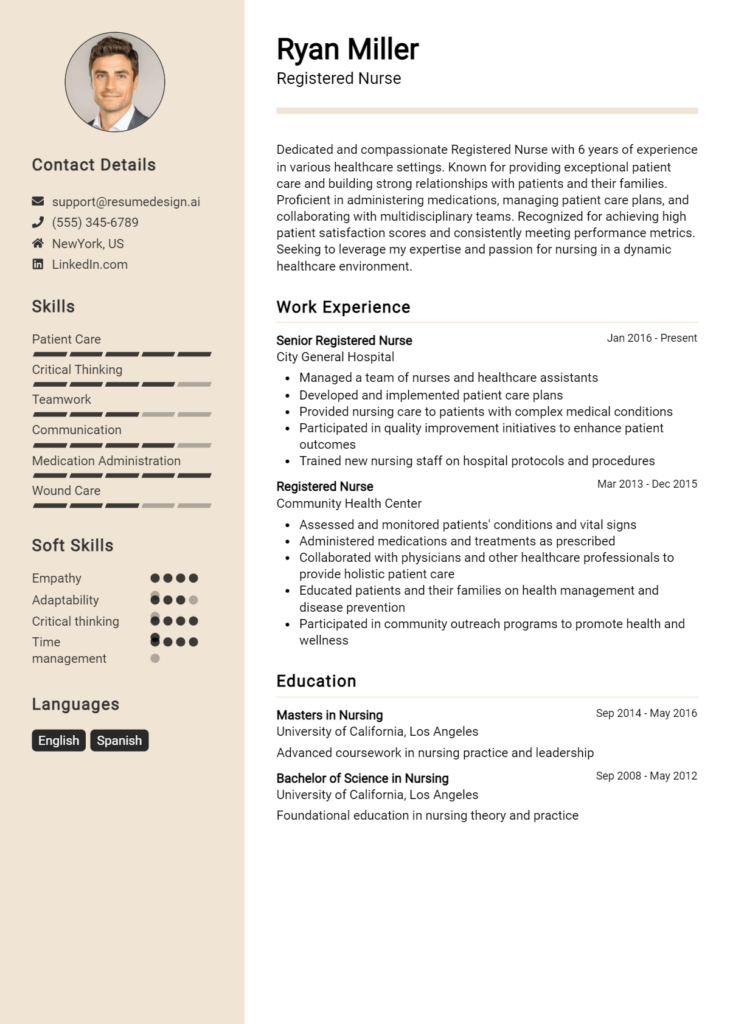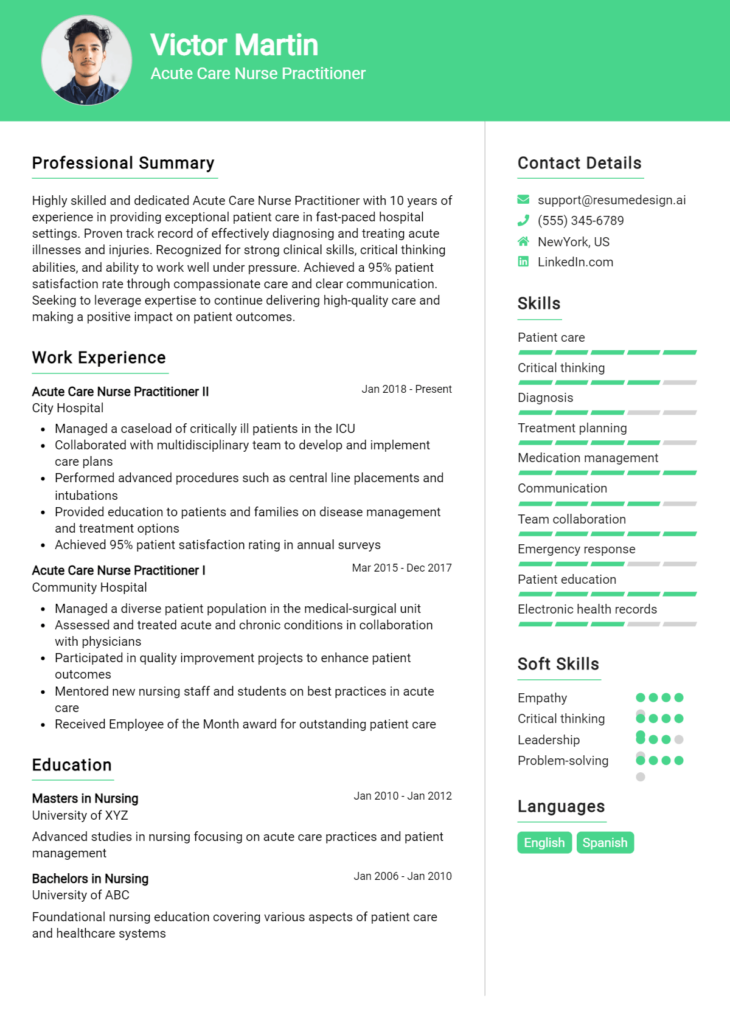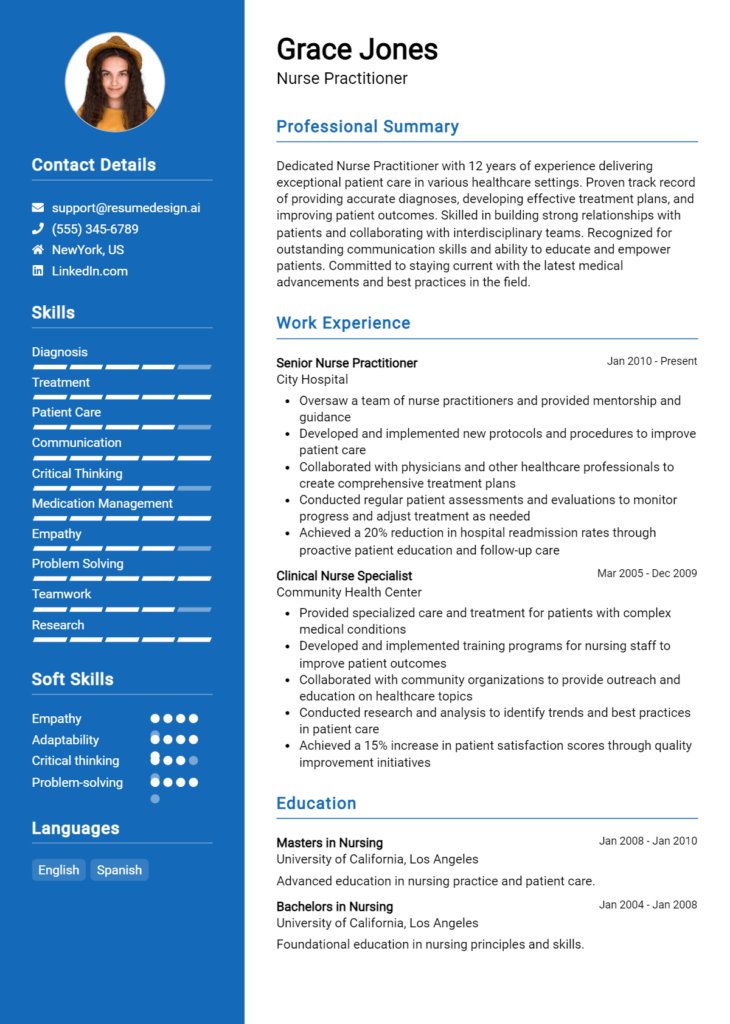Cardiac Care Nurse Core Responsibilities
A Cardiac Care Nurse plays a crucial role in monitoring and managing patients with heart-related conditions, requiring a blend of technical, operational, and problem-solving skills. They collaborate with various departments, including cardiology, surgery, and rehabilitation, to ensure comprehensive patient care. Essential skills include proficiency in cardiac monitoring, medication administration, and patient education, all contributing to the organization's overarching goals of enhancing patient outcomes. A well-structured resume highlighting these qualifications can significantly impact job prospects.
Common Responsibilities Listed on Cardiac Care Nurse Resume
- Monitor patients' vital signs and cardiac rhythms
- Administer medications and treatments as prescribed
- Educate patients and families about heart health
- Assist in cardiac diagnostic procedures
- Collaborate with interdisciplinary teams for patient care
- Maintain accurate patient records and documentation
- Develop and implement individualized care plans
- Respond to cardiac emergencies and provide life support
- Conduct patient assessments and evaluations
- Provide emotional support and counseling to patients
- Participate in quality improvement initiatives
- Stay updated on advancements in cardiac care and nursing practices
High-Level Resume Tips for Cardiac Care Nurse Professionals
In the competitive field of nursing, particularly in cardiac care, a well-crafted resume serves as a crucial tool for professionals aiming to make a strong first impression on potential employers. Your resume is not just a summary of your work experience; it is a reflection of your skills, accomplishments, and dedication to providing exceptional patient care. A compelling resume can set you apart from other candidates, showcasing your expertise in cardiac care and your ability to contribute to a healthcare team. This guide will provide practical and actionable resume tips specifically tailored for Cardiac Care Nurse professionals, helping you to highlight your unique qualifications and catch the eye of hiring managers.
Top Resume Tips for Cardiac Care Nurse Professionals
- Tailor your resume to align with the specific job description, using relevant keywords and phrases to demonstrate your fit for the role.
- Highlight your clinical experience in cardiac care settings, including specific patient populations you’ve worked with and the types of procedures you’ve assisted in.
- Quantify your achievements by including metrics such as patient outcomes, the number of patients managed, or improvements in care processes.
- Showcase your certifications, such as CCRN or BLS/ACLS, prominently to underline your commitment to continuous professional development.
- Incorporate evidence of collaboration with interdisciplinary teams to demonstrate your ability to work effectively within a healthcare environment.
- Emphasize your technical skills, including proficiency with cardiac monitoring equipment and electronic health record systems.
- Include any volunteer or leadership roles that highlight your passion for cardiac care and community involvement.
- Use action verbs to convey your responsibilities and contributions, creating a dynamic narrative of your professional experiences.
- Keep your resume concise and focused, ideally limit it to one page, while ensuring it remains easy to read and well-organized.
- Proofread for errors and ensure your formatting is consistent throughout to reflect professionalism and attention to detail.
By implementing these targeted resume tips, you can significantly enhance your chances of landing a position in the Cardiac Care Nurse field. A well-structured and impactful resume not only showcases your qualifications but also demonstrates your commitment to excellence in patient care, making you a standout candidate in a competitive job market.
Why Resume Headlines & Titles are Important for Cardiac Care Nurse
In the competitive field of healthcare, particularly for specialized roles like a Cardiac Care Nurse, a well-crafted resume headline or title serves as a powerful tool to capture the attention of hiring managers. A strong headline succinctly summarizes a candidate's essential qualifications and expertise, allowing them to stand out in a sea of applicants. It not only highlights the nurse's specialty in cardiac care but also conveys their unique strengths or accomplishments in a compelling manner. An effective resume headline should be concise, relevant, and directly aligned with the job being applied for, ensuring that it resonates with the priorities of hiring managers seeking top talent in cardiac nursing.
Best Practices for Crafting Resume Headlines for Cardiac Care Nurse
- Keep it brief: Aim for one impactful phrase that encapsulates your qualifications.
- Use keywords: Incorporate specific terms related to cardiac care and nursing to enhance relevance.
- Highlight specialty: Clearly state your focus on cardiac care to attract attention from specialized employers.
- Showcase experience: Include years of experience or notable achievements to convey credibility.
- Be specific: Avoid vague terms; use precise language that reflects your skills and expertise.
- Tailor to the job: Customize your headline for each application to align with the job description.
- Consider certifications: Mention relevant certifications or qualifications that set you apart.
- Avoid clichés: Steer clear of generic phrases that offer little insight into your capabilities.
Example Resume Headlines for Cardiac Care Nurse
Strong Resume Headlines
Compassionate Cardiac Care Nurse with 5+ Years of Experience in Critical Care
Dedicated Cardiac Nurse with Expertise in Patient-Centered Care and Advanced Cardiac Life Support
Licensed Cardiac Care Specialist Focused on Innovative Treatment Plans and Patient Education
Weak Resume Headlines
Nurse Looking for a Job
Experienced Healthcare Professional
The strong headlines are effective because they are specific, conveying both the candidate's area of expertise and their relevant experience in a concise manner. They create a clear picture of the candidate's qualifications that align with the needs of the employer. In contrast, the weak headlines fail to impress due to their vagueness and lack of focus, making it difficult for hiring managers to gauge the candidate's suitability for the Cardiac Care Nurse position. By avoiding generic phrases, candidates can ensure their resumes capture the attention they deserve.
Writing an Exceptional Cardiac Care Nurse Resume Summary
A well-crafted resume summary is a crucial element for a Cardiac Care Nurse, as it serves as the first impression for hiring managers. In a competitive field where specialized skills and experience are vital, a strong summary quickly captures attention by showcasing the candidate's most relevant qualifications. This concise and impactful introduction should highlight key skills, significant accomplishments, and pertinent experience related to cardiac care, tailored specifically to the job in question. An effective summary can set the tone for the entire resume, making it essential for candidates to invest time in creating a compelling introduction that resonates with potential employers.
Best Practices for Writing a Cardiac Care Nurse Resume Summary
- Quantify Achievements: Use numbers to demonstrate the impact of your work, such as patient outcomes or improved processes.
- Focus on Skills: Highlight specific skills that are critical for cardiac care nursing, such as proficiency in EKG interpretation or patient education.
- Tailor the Summary: Customize your summary to align with the job description, emphasizing the most relevant experience and skills.
- Use Action Verbs: Start sentences with strong action verbs to convey a sense of proactivity and effectiveness.
- Be Concise: Aim for 3-5 sentences that deliver your message clearly and succinctly.
- Showcase Certifications: Mention any relevant certifications, such as CCRN or BLS, to demonstrate your qualifications.
- Highlight Team Collaboration: Emphasize your ability to work within multidisciplinary teams to provide comprehensive patient care.
- Reflect Compassionate Care: Include language that showcases your commitment to compassionate patient care, which is vital in nursing.
Example Cardiac Care Nurse Resume Summaries
Strong Resume Summaries
Compassionate and dedicated Cardiac Care Nurse with over 5 years of experience in critical care settings, successfully managing a patient caseload of up to 10 individuals daily. Achieved a 15% improvement in patient recovery rates through the implementation of evidence-based care protocols.
Detail-oriented RN with a specialized focus in cardiac care, holding a CCRN certification. Proven track record of reducing readmissions by 20% through effective patient education and post-discharge follow-up. Skilled in EKG interpretation and telemetry monitoring.
Experienced Cardiac Care Nurse with a solid background in ICU settings, recognized for exceptional patient assessment skills and interdisciplinary collaboration. Played a key role in a quality improvement initiative that enhanced patient satisfaction scores by 30% within one year.
Weak Resume Summaries
Nurse with some experience in cardiac care and looking for a new opportunity. I am a team player and care about my patients.
Dedicated healthcare professional seeking a position as a cardiac nurse. I have worked in various settings and am ready for a new challenge.
The strong resume summaries are considered effective because they provide specific details about the candidate's experience, achievements, and skills relevant to the cardiac care nursing role. They quantify outcomes, which adds credibility and demonstrates the nurse's impact on patient care. In contrast, the weak summaries lack specificity and fail to highlight any measurable accomplishments, making them generic and less compelling to hiring managers.
Work Experience Section for Cardiac Care Nurse Resume
The work experience section of a Cardiac Care Nurse resume plays a crucial role in demonstrating not only the candidate's technical skills but also their ability to manage teams and deliver high-quality patient care. This section provides potential employers with insights into the nurse's hands-on experience in cardiac care settings, showcasing their proficiency in advanced medical procedures and technologies. By quantifying achievements—such as improved patient outcomes and efficient care delivery—and aligning experiences with industry standards, candidates can effectively illustrate their value and readiness for the challenges of the role.
Best Practices for Cardiac Care Nurse Work Experience
- Highlight specific technical skills relevant to cardiac care, such as ECG interpretation and patient monitoring.
- Use quantifiable results to demonstrate the impact of your work (e.g., “Reduced readmission rates by 20% through effective patient education programs”).
- Showcase leadership experience in managing nursing teams or coordinating with multidisciplinary teams.
- Incorporate keywords from the job description to align your experience with industry standards.
- Detail any specialized training or certifications relevant to cardiac care.
- Provide examples of collaborative projects with healthcare providers that improved patient outcomes.
- Emphasize your role in implementing evidence-based practices and protocols.
- Document continuous professional development activities, such as attending workshops or conferences related to cardiac care.
Example Work Experiences for Cardiac Care Nurse
Strong Experiences
- Led a cardiac rehabilitation program that increased patient participation by 30%, resulting in improved recovery times and enhanced quality of life.
- Implemented a new electronic health record (EHR) system that streamlined patient documentation processes and reduced errors by 25%.
- Collaborated with a multidisciplinary team to develop a patient-centered care plan that decreased post-operative complications by 15%.
- Provided mentorship and training to new nursing staff, enhancing team performance and ensuring adherence to best practices in cardiac care.
Weak Experiences
- Assisted in patient care duties on the cardiac floor.
- Worked with other nurses to provide support during shifts.
- Participated in team meetings to discuss patient care.
- Helped with general tasks related to cardiac patients.
The examples listed as strong experiences are considered effective because they highlight clear, quantifiable outcomes and specific contributions that demonstrate the candidate's technical leadership and teamwork skills. In contrast, the weak experiences lack detail and measurable impact, making them less compelling to potential employers who seek evidence of a candidate's capabilities in a demanding cardiac care environment.
Education and Certifications Section for Cardiac Care Nurse Resume
The education and certifications section of a Cardiac Care Nurse Resume is crucial in establishing the candidate's qualifications and expertise in the field of cardiac care. This section not only showcases the individual's academic background but also highlights relevant industry certifications and their commitment to continuous learning. By providing information on pertinent coursework, specialized training, and recognized certifications, candidates can significantly enhance their credibility and demonstrate their alignment with the requirements of the job role. This emphasis on education and ongoing professional development is essential in a field that demands high standards of patient care and clinical knowledge.
Best Practices for Cardiac Care Nurse Education and Certifications
- Include relevant degrees such as a Bachelor of Science in Nursing (BSN) or an Associate Degree in Nursing (ADN).
- List industry-recognized certifications, such as the Cardiac Vascular Nursing (CVN) certification or Advanced Cardiovascular Life Support (ACLS).
- Highlight any specialized training, such as cardiac rehabilitation or telemetry.
- Provide details on relevant coursework that pertains to cardiac care and nursing practices.
- Ensure that all certifications are current and include expiration dates if applicable.
- Use clear and concise language to describe educational qualifications and certifications.
- Tailor the education and certifications section to align with the specific job description and requirements.
- Consider including continuing education credits or workshops that demonstrate ongoing professional development.
Example Education and Certifications for Cardiac Care Nurse
Strong Examples
- Bachelor of Science in Nursing (BSN), University of Health Sciences, 2020
- Cardiac Vascular Nursing (CVN) Certification, American Nurses Credentialing Center, 2022
- Advanced Cardiovascular Life Support (ACLS), American Heart Association, 2023
- Coursework in Cardiac Physiology and Pharmacology, University of Health Sciences
Weak Examples
- Associate Degree in Arts, Generic Community College, 2015
- Basic Life Support (BLS) Certification, expired 2020
- Coursework in General Psychology unrelated to nursing or cardiac care
- Certification in Food Safety, irrelevant to nursing practices
The strong examples listed are considered effective as they directly pertain to the qualifications and skills needed for a Cardiac Care Nurse, showcasing relevant degrees and recognized certifications that demonstrate expertise in the field. In contrast, the weak examples fail to align with the job requirements, highlighting outdated or unrelated educational qualifications that do not contribute to the candidate's suitability for the role. This distinction is critical in presenting a compelling case for employment in cardiac care nursing.
Top Skills & Keywords for Cardiac Care Nurse Resume
A well-crafted resume is crucial for a Cardiac Care Nurse, as it serves as the first impression for potential employers. Highlighting the right skills is essential to demonstrate your competence in providing specialized care for patients with cardiovascular conditions. Effective communication, clinical expertise, and the ability to work under pressure are just a few examples of the skills that can set you apart in this competitive field. By showcasing both hard and soft skills, you can present a comprehensive picture of your capabilities, making your resume stand out to hiring managers.
Top Hard & Soft Skills for Cardiac Care Nurse
Soft Skills
- Compassionate patient care
- Effective communication
- Critical thinking
- Team collaboration
- Time management
- Adaptability
- Emotional intelligence
- Problem-solving
- Attention to detail
- Stress management
Hard Skills
- ECG interpretation
- Patient assessment
- Cardiovascular pharmacology
- Advanced cardiac life support (ACLS)
- Invasive monitoring techniques
- Rehabilitation techniques
- Knowledge of cardiac procedures
- Electronic health record (EHR) proficiency
- Vital signs monitoring
- Patient education and counseling
For more on how to effectively highlight your skills and work experience, consider tailoring your resume to reflect your unique qualifications and experiences in the field of cardiac care nursing.
Stand Out with a Winning Cardiac Care Nurse Cover Letter
Dear [Hiring Manager's Name],
I am writing to express my enthusiasm for the Cardiac Care Nurse position at [Hospital/Organization Name] as advertised on [Where You Found the Job Posting]. With a Bachelor of Science in Nursing and over [X years] of dedicated experience in cardiac care, I am confident in my ability to provide exceptional patient care while supporting the vital mission of your esteemed facility. My passion for cardiovascular health, combined with my clinical expertise, positions me well to make a significant contribution to your team.
Throughout my career, I have honed my skills in assessing and monitoring patients with various cardiac conditions, including heart failure, arrhythmias, and post-operative recovery. My experience in administering medications, managing intravenous lines, and utilizing advanced cardiac monitoring equipment has equipped me with the technical proficiency necessary to excel in a fast-paced cardiac unit. Additionally, my strong communication skills have allowed me to build meaningful relationships with patients and their families, ensuring they are well-informed and supported throughout their treatment journey.
At [Previous Employer's Name], I had the opportunity to lead a patient education initiative aimed at empowering individuals with heart disease to manage their conditions effectively at home. This program not only improved patient outcomes but also fostered a sense of community among participants. I believe that education and support are crucial components of cardiac care, and I am eager to bring this philosophy to [Hospital/Organization Name]. I am excited about the possibility of collaborating with your multidisciplinary team to enhance the quality of care for cardiac patients.
Thank you for considering my application. I am looking forward to the opportunity to discuss how my skills and experiences align with the needs of your team. I am eager to contribute to [Hospital/Organization Name] and support your commitment to providing exceptional cardiac care.
Sincerely,
[Your Name]
[Your Contact Information]
Common Mistakes to Avoid in a Cardiac Care Nurse Resume
When crafting a resume for a Cardiac Care Nurse position, it’s essential to present your skills and experiences in the most effective manner. However, many candidates fall into traps that can diminish the impact of their resumes. Avoiding these common mistakes can significantly enhance your chances of landing an interview. Below are some frequent pitfalls to watch out for:
Generic Objective Statements: Using vague or overly general objective statements fails to convey your specific interest in cardiac care nursing and does not highlight your unique qualifications.
Lack of Relevant Keywords: Failing to include industry-specific keywords can result in your resume being overlooked by applicant tracking systems (ATS) that many employers use to filter candidates.
Overly Complex Language: Using complicated jargon or overly technical terms can confuse the reader. It's better to use clear and straightforward language that accurately communicates your qualifications.
Ignoring Quantifiable Achievements: Not showcasing measurable outcomes (e.g., improved patient recovery times or reduced readmission rates) misses the opportunity to demonstrate your impact and effectiveness as a nurse.
Omitting Certifications and Licenses: Forgetting to list relevant certifications, such as Basic Life Support (BLS) or Advanced Cardiovascular Life Support (ACLS), can lead to an incomplete impression of your qualifications.
Inconsistent Formatting: Using inconsistent fonts, sizes, or styles can make your resume appear unprofessional. A clean, uniform format enhances readability and professionalism.
Neglecting Continuing Education: Not mentioning ongoing education or professional development can suggest a lack of commitment to staying current with best practices and advancements in cardiac care.
Too Much Personal Information: Including excessive personal details, such as marital status or hobbies that are unrelated to nursing, can detract from the professionalism of your resume and may raise unnecessary privacy concerns.
Conclusion
As a Cardiac Care Nurse, you play a vital role in the healthcare system, providing specialized care to patients with heart conditions. Throughout this article, we've explored the essential skills required for this position, including advanced clinical knowledge, patient assessment capabilities, and effective communication. We also discussed the importance of empathy and support in your interactions with patients and their families, as well as the need for continuous professional development to stay updated on the latest practices in cardiac care.
In conclusion, it’s crucial to ensure that your resume reflects not only your qualifications but also your passion for cardiac nursing. A well-crafted resume can make a significant difference in your job search, showcasing your skills and experiences effectively. We encourage you to take the time to review and enhance your Cardiac Care Nurse resume.
To assist you in this process, consider utilizing available resources such as resume templates, which can provide a solid foundation for your document. If you prefer a more personalized approach, try using our resume builder to create a tailored resume that highlights your unique qualifications. Additionally, you can explore resume examples for inspiration and ideas on how to present your experience effectively. Don’t forget to complement your resume with a polished cover letter using our cover letter templates to make a lasting impression on potential employers.
Take action today to elevate your resume and enhance your chances of landing your dream role as a Cardiac Care Nurse!

